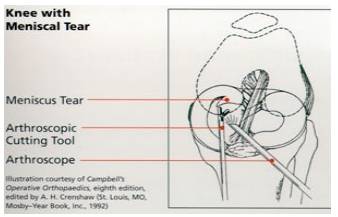Knee Arthroscopy
Please note, this page is printable by selecting the normal print options on your computer.
What is a knee arthroscopy?
A knee arthroscopy is a procedure whereby a ‘telescope-like’ instrument is used to look inside the knee. It is a minor surgical procedure used for diagnosis and treatment of some knee problems.
We hope this information leaflet will support the discussion you have had with your doctor during your appointment time.

The operation
The surgeon will insert the arthroscope into your knee through two small incisions (cuts). The surgeon will examine the knee via the pictures that are produced via the arthroscope on a television screen. By moving the arthroscope into different positions via the incisions the surgeon is able to see the entire knee joint. Quite often the surgeon is able to perform corrective surgery at the same time as the examination.
Anaesthetic
You will usually have a general anaesthetic for this procedure, although an epidural or spinal anaesthetic is sometimes performed.
What are the benefits of the procedure?
Arthroscopy is a very valuable tool for the diagnosis and treatment of damage or disease to the joint and is generally much easier on the patient than ‘open’ surgery. Most patients have their knee arthroscopy surgery as day cases and are home several hours after surgery.
What are the complications of the procedure?
Although very rare, complications do occur occasionally during or following arthroscopy. These complications include the following:
• Infection
There is a very small risk of infection.
• Swelling or bleeding may occur but usually improves very quickly and rarely results in any long term problem.
• Thrombosis
There is a very small risk of thrombosis.
• Occasionally, during arthroscopy, the surgeon may discover that the injury or disease cannot be treated adequately with arthroscopy alone.
Will I have to stay in hospital?
The length of stay following your knee arthroscopy may vary according to how your rehabilitation progresses. Our aim is for you to go home on the day of your operation.
Will I have stitches?
Some Surgeons use stitches others do not. If you have stitches these will normally be removed 10 – 12 days after your operation by the Practice Nurse at your family doctor’s (GP) surgery.
Will I need any special treatment or care during my recovery?
Once given an operation date please book an appointment with your practice nurse for the following day for dressing review. Day surgery unit will provide dressings on discharge. You will be given an information sheet of exercises to do in supporting the rehabilitation of your knee. An appointment will be made for you to see a Physiotherapist at the Physiotherapy Outpatients
Department. You will be given an appointment to attend the Outpatients Department Clinic at the hospital for review usually 4 weeks after your surgery.
When can I return to work?
This will depend on the type of work you are involved with. It is not unusual for patients to go back to work or school or resume daily activities within a few days. Athletes and others who are in good physical condition may in some cases return to athletic activities within a few weeks. It is important to remember, that people who have arthroscopy can have many different diagnoses and pre-existing conditions, so each patient’s arthroscopic surgery is unique to that person. Your recovery time will reflect that individuality. Your doctor will talk to you about what is most appropriate for you.
When can I start driving again?
You can usually start to drive again 5 – 7 days after your operation provided you can perform a controlled emergency stop. However, it is always important to speak to your Insurance Company before driving to ensure that you are adequately covered with your car insurance after this type of procedure – they may have their own guidelines for this.
What happens next?
Your name will be placed onto the waiting list. You may be required to attend for a pre-assessment before your operation.
• Pre-assessment – to make sure you are well enough for the operation. You will also receive more information about the arrangements for coming into hospital and what you will need to bring
with you. If, whilst on the waiting list, you feel you no longer need this operation speak to your family doctor in the first instance and secondly let the Admissions Office at the hospital know by calling telephone number: 01908 996798.
People are unique and the alternatives, risks and benefits will of course vary from person to person.
We hope this leaflet will support the information you have already received from your doctor in enabling you to make an informed decision.
